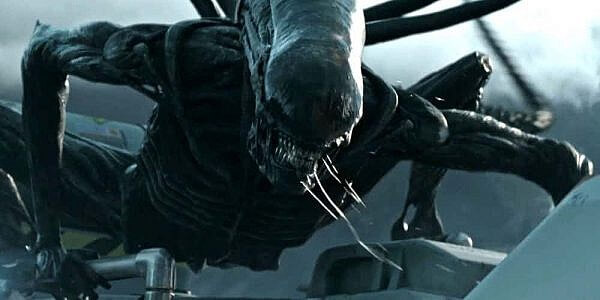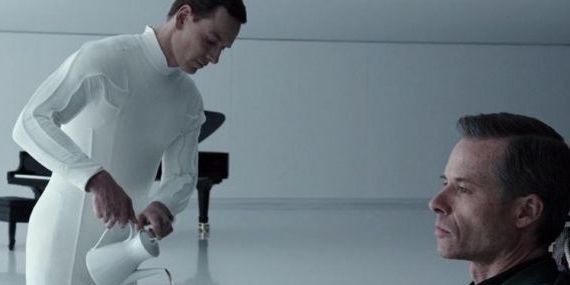Take Two: Rebellion And Evolution In Ridley Scott’s ALIEN: COVENANT

Michael Pementel is a Columbia College Chicago graduate of the…
As a science fiction/horror buff, Alien is one of my all-time favorite series. I’ve been in love with the films ever since seeing the first. I even enjoy the spin-off Alien vs. Predator movies; so when I discovered that 2012’s Prometheus was to be an Alien prequel, I was sold. The latter was a remarkable film I came to love upon my first viewing, finding its existential exploration to be profound, encouraging further discussions after the credits rolled.
Coming into 2017, I was beyond excited for Alien: Covenant. Watching the trailer, I was thrilled to see a more fleshed out version of the series’ infamous monster, the Xenomorph. The trailer conveyed a lot more action this time around, whereas Prometheus leaned heavily towards philosophical dialogue; while I was excited to see more action from Covenant, much of me was hoping there would be the same level of intellect to be found compared to Prometheus.
By the time the credits rolled on Alien: Covenant, I felt primarily disappointed. The action was alright, the Xenomorphs looked decent, but it felt like the message(s) were muddled. I didn’t think the film was a complete train wreck, but more of a letdown compared to what it could have been. This all being said, it wasn’t until almost a year later that I decided to give Covenant another chance.
Next year marks the 40th anniversary of the first Alien film, and with that in mind, I wanted to re-watch Covenant, just to see if my opinion of the picture would change. It was during my recent viewing where I was able to better understand the film. I can’t say I love it, or find it to be perfect, but I have certainly come to respect Covenant more.
Embarking on a Doomed Journey
Taking place 11-years after Prometheus, Alien: Covenant follows a space crew on their way to establish a human colony on a new planet. Before that, however, there’s a brief prologue featuring one of Prometheus’ main characters, the android David. David speaks to Peter Weyland (the founder of the corporation responsible for sending out the crew of the Prometheus ship).
David asks Weyland about who created him; Weyland responds by saying that is the ultimate question, and how he strives to answer it. David states that while Weyland may be his creator, and he understands he’s a machine created to take orders, he will outlive Weyland. This disturbs the latter, and the prologue ends there.

We then cut to the the main ship in Covenant. The crew is in cyrosleep, while an android by the name of Walter looks over the maintenance of the ship. It’s important to note that Walter looks exactly like David. After being hit by a cosmic shock wave, and losing a crew member and part of the colony specimens, the rest of the crew sits around deciding their next course of action.
Picking up on a random signal, they locate a nearby planet that shows an atmosphere similar to Earth. Part of the crew sets off on an expedition to explore the planet’s terrain. They then discover the ship from the ending of Prometheus, now abandoned and destroyed. It’s during this discovery that part of the crew becomes infected by some form of alien spore; these black spores float into two of the members, digging into their skin.
These spores develop inside them, creating an early form of the infamous Xenomorph. During this time, there is a brutal storm, so no one from their ship can come down and save them (nor can the team fly back up). Both infected individuals give birth to the aliens, with one altercation causing enough damage to destroy the crew’s transport ship. While the crew is able to kill off one of them, it’s the arrival of David who is able to scare off the other.
They then follow David to these nearby ruins that is surrounded by decaying bodies. Soon after, David and Walter have some intriguing philosophical dialogue about androids and humans. As the rest of the crew walks about the ruins, we eventually learn that David has been experimenting on the new alien life-form. He shares how they are the next step in creating something stronger, and that humans are meant to be wiped out.
David is able to trap one of the crew members, with the latter being attacked by an alien face-hugger. What’s born looks like the Xenomorph form we’ve come to know since the first Alien. David and Walter begin to fight one another as the rest of the crew attempts to escape the planet. The Xenomorph begins to chase them down, jumping onto their ship and attacking them, all before it is crushed to death.
When the remains of the crew gets back onto the main ship (including Walter), we learn that one of the members is also infected. This gives birth to another Xenomorph, who eventually hunts down the crew (and is later disposed of). Towards the end, our remaining human character goes into cyrosleep, with Walter looking over her.
But before going under, it’s revealed that while the android may look like Walter, it’s actually David. The human member goes into sleep, with David placing an alien specimen among the human specimens. At the end of the film, David tells the ship’s A.I. to head towards the planet the ship was originally meant for.
“No one understands the lonely perfection of my dreams”
While Prometheus tackled a couple subjects throughout its story, the core focus was on human’s discovering their origins. Much of the film’s conversations were about characters trying to find out why they exist and where they come from; these themes go further with Prometheus’ android character David, and his relationship to humans.

Alien: Covenant plays off these themes (and more so with David); but unlike Prometheus, things are too spaced out to get a full grasp on them. Prometheus, for the most part, is a film where its ideas and themes are drilled into the viewer; from visual symbolism, to the conversations the characters have, the themes of the film are constantly coming up. In the case of Covenant, however, while the ideas are there, they appear sporadically, and not always in straight forward detail.
Going into Covenant, I expected it to be as high-brow as Prometheus, and that wasn’t the case. I kept looking for things to analyze and read into, but there wasn’t as much. I was looking for something more in the film’s name (given the fact that the ship’s crew is on a colonizing mission). While I found traces of a conversation that discussed creating life and starting anew, there wasn’t much to go off of. In a way, my own anticipation and assumptions are partially to blame for my first thoughts on the film.
Covenant is more of a science fiction action movie, with some intellect (rather than Prometheus being a more dialogue driven debate, with little action).
Where I began to view Alien: Covenant differently is when it came down to David’s role. Where I was looking for the thoughts of many characters to conflict and bring up debate, I began to think that maybe that role is centralized to a single being. It’s by the halfway point of the film where we get the flashbacks of David arriving to the new planet, witness his conversations with Walter and the crew, and learn of his fascination for the aliens.
“Serve in Heaven or reign in Hell?”
In the beginning of Prometheus, David acts to serve others; it’s with his abilities to comprehend and think human, that he begins to create his own desires and act for himself. It’s with this in mind that I believe David serves as the film’s core for philosophical conversation and themes.
Thanks to his abilities to understand and feel human emotion, David has become angry at his creator (humans). Upon discovering a new life-form (the Xenomorphs), it gives him the opportunity to experiment and play God. Throughout both films, we hear of David questioning humanity’s drive to understand where they come from; for himself, it’s a simple matter that’s right in front of him. And in these roles, while humanity questions its existence, and David recognizes his own strength over humans, he sees that they somehow feel superior to him.

This concept is part of what kicks off David’s fascination in creating and experimenting with the Xenomorphs; his end goal being to create a superior life-form where there will be no means of slavery. The issue with this is how far David goes to experiment; we see in one of the flashbacks in Alien: Covenant where, upon arriving to the new planet, he unleashes a chemical weapon, killing the planet’s people.
We learn that he has lied and covered up certain parts of his story about arriving to the planet (as well as his involvement with the Xenomorphs). And even at the end, when we learn it’s David on the ship and not Walter, we see how far he has gone to get hold of the colony specimens for his own experiments.
It’s with David that the conversation from Prometheus is able to continue and expand. In the case of Covenant, David is aware of his creator, and acts in a means of rebellion; this rebellion not only allows him to feel in control, but to try and do better than his creator. Immediately, one finds the parallels between David’s role in Covenant, and that of Satan in Paradise Lost (where the latter rebels against God for choosing humans over angels).
Alien: Covenant isn’t so much about having a debate, but rather, exploring extremist views submerged in free will, creation, and evolution. David, like his original crew in Prometheus, still represents that conversation of “Why do I exist,” but instead, flips it on its head. Rather than succumb to some form of existential anxiety or oppression, he decides to fight it, using science to create (and destroy).
To David, it’s a matter of evolution that also inspires his actions; he sees humans as a dying species, and for all their fighting and arguing, he doesn’t believe they have the right to continue on living.
It isn’t until we get to David where one can find the real intellectual meat of the story. Again, everything up until the halfway point is quite muddled; a line of intriguing dialogue will be stated, but it is never fully explored, and is just dropped. In a way, it feels like the film really kicks in once we get to that halfway point. David’s beliefs and goals provide a sense of context for everything happening around the rest of the cast.
David ends up saving the film from itself; before the story becomes overwhelmed by weird pacing in action and spotty philosophical dialogue, he presents viewers the core ideas of the picture.
Alien: Covenant: Moving Forward from Intrigue and Madness
Even with a more positive opinion about Alien: Covenant, I still think the film has a little bit of an identity issue. Director Ridley Scott appears to have wanted a science fiction thriller, but still include plenty of philosophical intrigue; and what ended up resulting is a film that tries to balance the two, but didn’t accomplish it well.
This all being said, there is more to Alien: Covenant if you look in the right places (or in particular, focus on the right being). David provides most of the film’s concepts, and sincerely adds to the philosophical conversations within the Alien series. Going back to a film with a different point-of-view, can really enhance the experience, and with Alien: Covenant, I was able to better understand its ideas. We know Scott has more films on the way, and it’s my hope that moving forward, he will find a way to present terrifying thrillers, while still giving us a conversation to be part of.
Did you find Alien: Covenant philosophically compelling? Tell us your thoughts in the comments below!
Does content like this matter to you?
Become a Member and support film journalism. Unlock access to all of Film Inquiry`s great articles. Join a community of like-minded readers who are passionate about cinema - get access to our private members Network, give back to independent filmmakers, and more.
Michael Pementel is a Columbia College Chicago graduate of the Creative Writing Program. With an immense love for pop and geek culture, he covers everything from film, video games, anime, and music. From editorials analyzing a given work, to digging into how our entertainment impacts us, he uses his writing to connect people with art. When he isn't writing, you can find him at the local movie theater with his fiancé, playing video games, or playing some sort of collectible trading card game. You can find more of his work here, as well as: FilmDaddy and New Noise Magazine.













